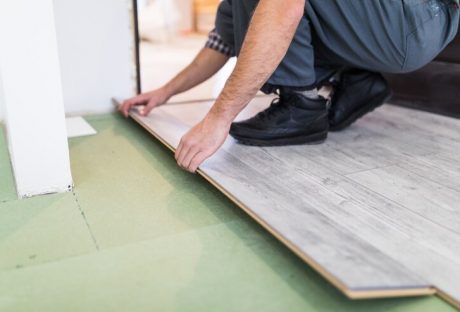When we think of air quality issues what comes to mind is often industrial factories or people blowing smoke in our face. But anything you use to build or decorate your home can have a positive or negative impact the air quality inside your home. Air quality can be directly linked to life expectancy so it’s an issue that should
1. Check your Paint:
Choosing the right paint is important. We sleep in rooms covered with paint every night. As the paint dries volatile organic compounds (or VOCs) escape into the air and can negatively impact the air quality in your house. These chemicals can cause headaches and dizziness and the long-term effects of exposure are not yet known.
Choosing non-toxic paint for your living quarters will have positive health benefits for years to come. Low or no VOC paints are the best choice for an eco-friendly home. Over the last several years paint companies have introduced many excellent options.
2. Check Your Flooring:
Vinyl and synthetic carpets emit loads of VOCs. If you’re looking for non-toxic, allergy-friendly flooring try cork, linoleum, or ceramic tile. Hardwood floors have become quite popular, but if you want the beauty without the toxic chemicals buy hardwoods sealed with a water-based polyurethane or presealed hardwoods.
3. Consider purchasing an air purifier:
Buying a quality air filter can be a good tool in your arsenal in the fight against toxic chemicals. Be sure to buy a model with a HEPA (high-efficiency air particle absorbing) filter. Don’t skimp and buy the cheapest filter you can find, view this purchase as an investment. The CADR (clean air delivery rate) of your purifier is also important. The higher the CADR number the more air is moving through the purifier. Air purifiers with high CADR numbers can be used to purify the air in larger spaces. However, before investing in an air filter, it’s essential to start with an air quality test. Conducting an Air Quality Testing in Roxbury Township, NJ, or wherever you are, can help identify specific pollutants in your environment, allowing you to choose the right purifier for your needs.
4. Plug Your Leaks:
Mold and mildew can have a significantly negative impact on your home’s air quality. Make sure your home is free of leaks. It’s important to check the places that get the least traffic in your home. Make sure your basement, attic, crawl space, and utility closet are free of water and moisture. It’s a good idea to call a professional who can help you pinpoint problem areas.
5. Test Your Home for Radon:
Radon is an odorless, colorless gas that can cause lung cancer in healthy humans. Radon is the gas produced by the decay of uranium in most soil. If there are gaps or holes in your home’s foundation radon gas can seep into your living space undetected. Any home can have a radon gas problem. You can buy an inexpensive test kit at your local hardware or home improvement store. There is no safe level of radon exposure.
Read Also:






















